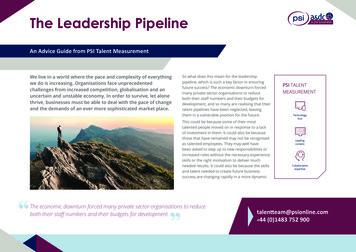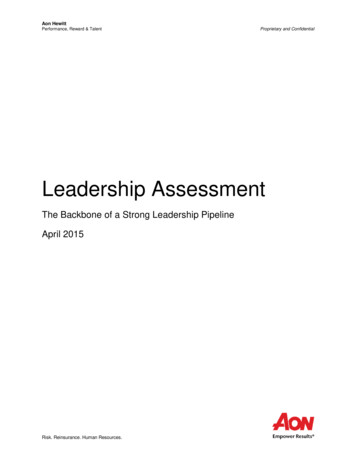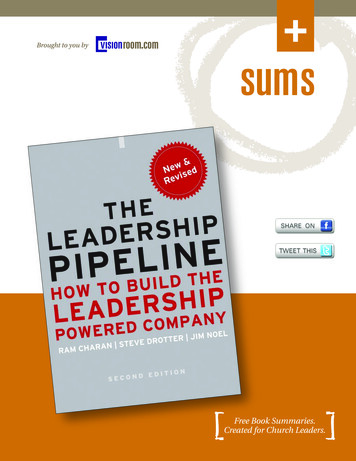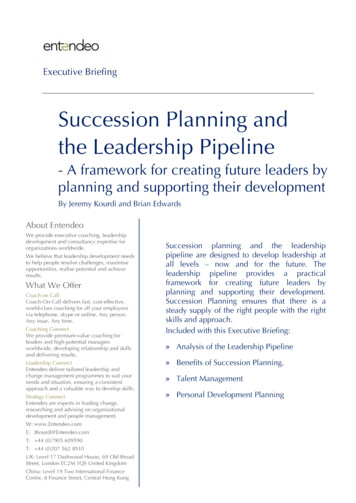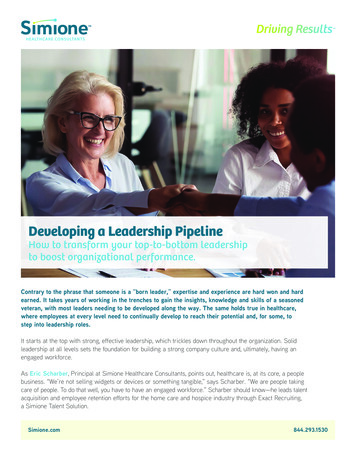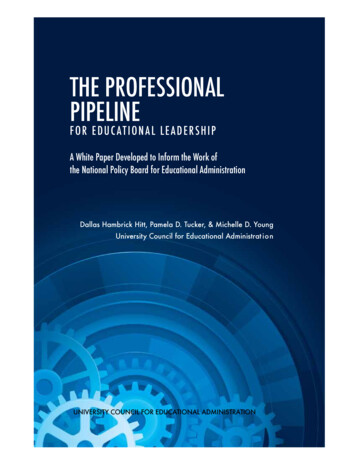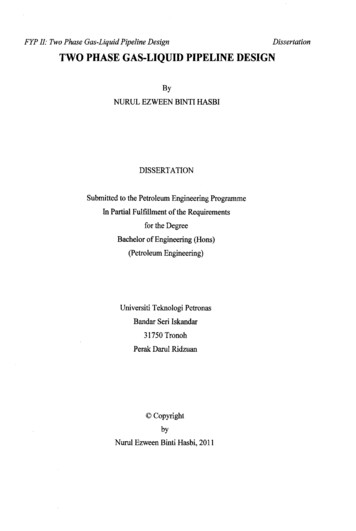
Transcription
Developing the ILO Leadership Pipeline“We know that leadership is verymuch related to change. As the paceof change accelerates, there isnaturally a greater need for effectiveleadership.”John KotterILO leaders must respond to a diverse set of constituent needs and deliver on the ILO’s mandate inan effective, accountable and results-oriented manner. They also face a range of challenges markedby an increasingly volatile, uncertain, complex and ambiguous environment.To support our leaders in meeting these challenges, the Human Resources DevelopmentDepartment (HRD) has focused its efforts on refining existing offerings, and implementing new andinnovative ways to accelerate the development of current and future ILO leaders across the Office.This includes a combination of different approaches and methods including on-the-job learning,upward feedback, executive coaching, distance learning, instructor-led training and targetedleadership communications.HRD introduced a four-tiered leadership development framework in 2014 to help guide systematiccapability building throughout the organization. Each level requires different skill-sets andcompetencies, and, at each transition, these capabilities must be developed in order to leadsuccessfully.Guided by the ILO’s leadership competencies and the skill/behavioural requirements at eachleadership level, emphasis has been placed on customizing initiatives to the unique needs of eachtarget audience, and on leveraging learning activities delivered by the ITC/ILO and the UN SystemsStaff College (UNSSC). HRD is also working to shift the focus from leadership development as a “oneoff” program to an “integrated process approach to learning” which emphasizes leadership as ajourney.1
Leadership Development Activities 2014-15In 2014-15, an array of leadership development activities were delivered to ILO leaders at all levelsthroughout the organization:HRD has continued to diversify and expand its portfolio of professional development offerings. Thebiennium opened with the launch of two new global initiatives, the Executive Leadership & StrategicManagement Programme (ELSM) for managers in collaboration with ITC/ILO and the UNSSC, andUpward Feedback for responsible chiefs. Upward Feedback is a key process for fueling growth andbehaviour change as it provides valuable input for performance review discussions around requiredmanagerial competencies and guides development planning. Given the success of the initiative,Upward Feedback was extended in 2015 to 328 managers including 124 responsible chiefs and 204supervisors.The demand for Executive Leadership Coaching has grown steadily with 68 senior managers acrossthe organization having benefitted this biennium. Coaching provides an individualized developmentopportunity that addresses managers’ specific learning needs, promotes a sense of autonomyregarding managers own development, and reinforces a developmental process over time. Throughone-to-one feedback, action planning and on-the-job application, this tailored learning activity2
assists managers to deliver more effective results, break down barriers to collaborative work andbuild teamwork across the Office.Personalised Executive Communications Coaching has also contributed to accelerated developmentin the area of public speaking through one-to-one feedback. This biennium, 64 colleaguesparticipated in this half-day training focused on preparing managers for important meetings,presentations, media interviews and speeches. Building managers capacity and confidence toensure that internal and external communications are adapted to target audiences, results-focused,diplomatic and delivered with maximum impact is a key aim of this training.HRD has regularly supported Directors in the field to attend the UN Country Team Leadership Skills(UNCT) course for senior UN leaders organized by the UNSSC. In response to the decisions from thefield structure review, HRD increased its assistance for this important UN-wide capability buildingand networking event (20 officials participated this biennium). Attendance will continue to bepromoted and supported in order to enhance the impact of the ILO at the country level througheffective integration with UN country teams. The course also provides an excellent opportunity forthe ILO to build strategic partnerships with leaders across a variety of UN agencies.To further support leadership development in the field, a new capacity building programme‘Maximizing Field Office Performance’ was designed in coordination with the Turin Centre anddelivered to 15 office directors in December 2015. The programme is focused on strengthening thedelivery capacity of directors on advanced operational level aspects of office management andadministration.The Emerging Leaders workshop has also provided an excellent opportunity to promote networkingand collaboration within the ILO by supporting field colleagues to attend the session in headquarters(87 officials participated this biennium). HRD will continue to support emerging leaders bysystematically targeting mid-level managers in HQ and the field.3
Leadership Development Expenditure 2014-15In 2014-15, 24% of the staff development funds managed by HRD were devoted to leadershipdevelopment. The breakdown below details the expenditure on the individual activities, and the costratio for ILO participants from the field and HQ.Field60%HQ40%Going ForwardHRD will continue to focus its efforts on developing an ILO leadership pipeline that will support theprocess of reform and change. A stronger and more capable ILO will enable the organization toeffectively deliver its mandate now and in the future.Leaders of ILO staff and programs have a responsibility to operate as skilled and responsivemanagers, and to ensure that the services provided to its constituents are of the highest quality anddelivered efficiently. To perform these responsibilities effectively, ILO managers must deepen andextend the ILO’s influence in the multilateral system, demonstrate excellent communication skills inboth internal and external communication, have a solid understanding of ILO operational issues, andlead multidisciplinary teams in an effective and inspiring manner.4
A mentoring programme was piloted in 2009 for newly appointed senior leaders and since that timehas operated on an ad hoc basis. Given the benefit that mentoring can bring to the Office, HRD willextend the programme to a wider group of ILO leaders. The programme aims to foster dialogue andknowledge sharing to assist leaders in achieving their professional and personal goals. Mentoringcan also help individuals who wish to develop in a specific area, or support them in effectivelytransitioning into a new role.Recognizing that people learn 70% of their roles “on the job,” greater functional and geographicmobility within the Office will provide vital preparation for future leaders. The Employee Profilemodule in ILO People captures, tracks, and monitors management and leadership expertisethroughout the organization. This information provides an overview of available skills andexperience, helps to identify skill gaps, and informs the work of the Recruitment AssignmentMobility Committee (RAMC).5
Developing the ILO Leadership Pipeline “We know that leadership is very much related to change. As the pace of change accelerates, there is naturally a greater need for effective leadership.” John Kotter ILO leaders must respond to a diverse set

